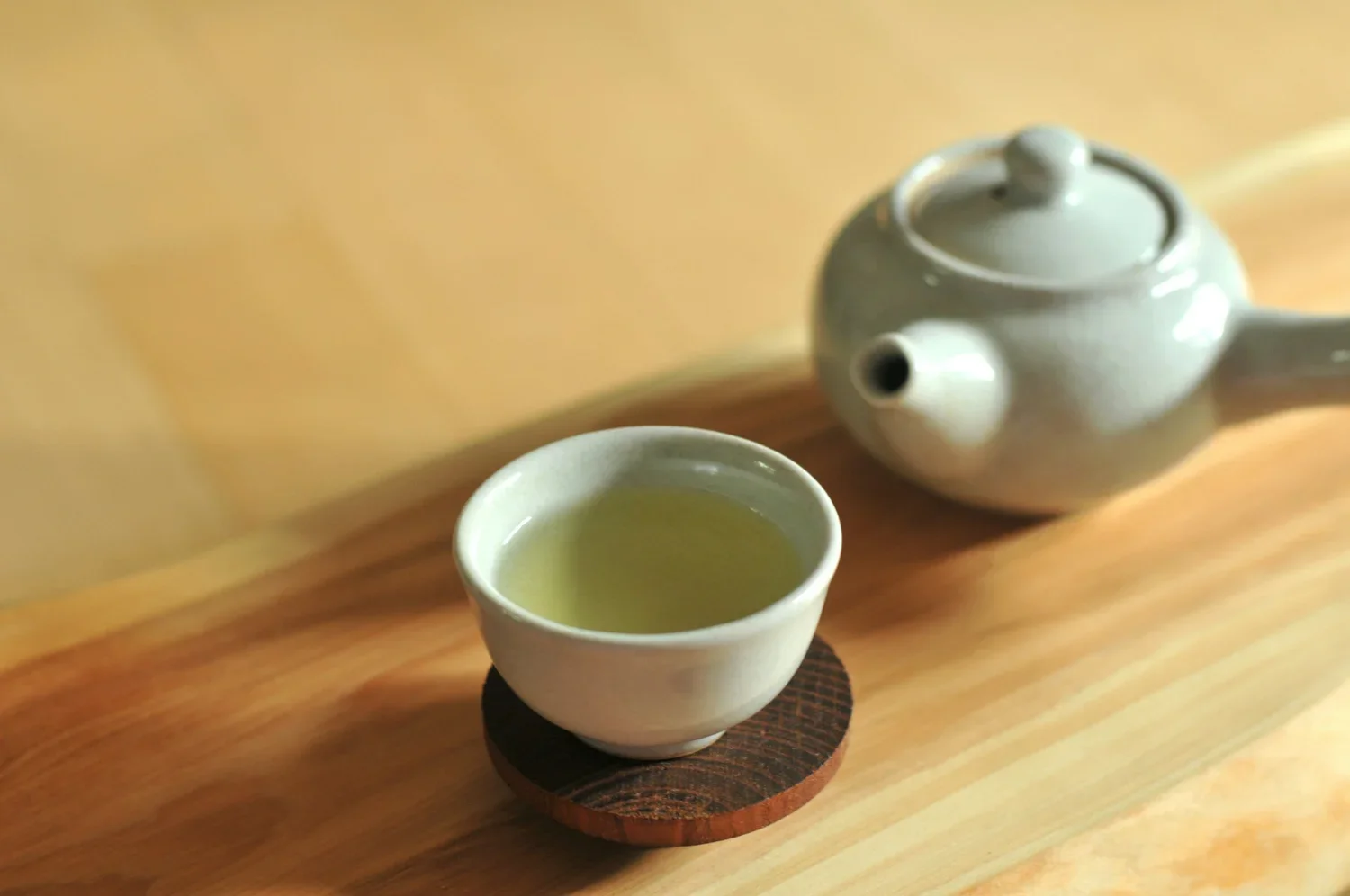Is Green Tea Good for You? Explore the Health Benefits of Green Tea
Ever wondered if that comforting cup of green tea is doing more for you than just warming your hands? Well, you're onto something! For thousands of years, from ancient ceremonies in China and Japan to modern-day cafes, green tea has been celebrated not just for its delicate flavor but also for its impressive array of health-boosting properties. It's amazing to think that a simple leaf from the Camellia sinensis plant can pack such a punch, right? One large Japanese study following 40,000 adults even linked daily green tea consumption (five or more cups) to a lower risk of death from cardiovascular diseases. Now that's a stat worth brewing over!
I'm excited to dive into what makes green tea such a superstar in the world of wellness. We'll explore everything from its rich antioxidant content to how it might give your metabolism a friendly nudge. Whether you're a long-time green tea aficionado or just curious about what it can offer, we're about to uncover the science and tradition behind this incredible beverage. And hey, if you're looking for a convenient way to enjoy high-quality green tea, perhaps with a delightful twist, your local ShareTea might just have what you're looking for, from classic brews to exciting green milk tea creations!
What are the health benefits of green tea?
How does drinking green tea improve overall health?
Drinking green tea is like giving your body a shield forged from nature's best. The primary way green tea contributes to overall health is through its rich concentration of antioxidants, particularly a class of polyphenols called catechins. These powerful compounds combat oxidative stress, which is a key player in aging and many chronic diseases. Think of antioxidants as your internal bodyguards, neutralizing harmful free radicals before they can cause damage to your cells.
Beyond just antioxidant action, green tea consumption has been associated with improved bodily functions. For instance, regularly drinking green tea may help maintain a healthier inflammatory response. It also contributes to better hydration, which is fundamental for nearly every process in your body, from circulation to temperature regulation. And let's not forget the mental aspect; the presence of L-theanine in green tea can promote relaxation and focus without the jitters often associated with other caffeinated drinks.
What potential health benefits does green tea offer?
The list of potential health benefits attributed to green tea is quite extensive, thanks to its unique chemical composition. Here are some of the most notable advantages that research suggests:
Enhanced Cardiovascular Health: Studies have indicated that green tea may support heart health by improving cholesterol levels—specifically lowering LDL (bad) cholesterol—and by promoting healthy blood vessel function. This, in turn, can contribute to a reduced risk of heart disease and stroke.
Improved Brain Function: The combination of caffeine (in moderate amounts) and L-theanine in green tea can enhance brain functions like mood, vigilance, reaction time, and memory. L-theanine increases the activity of the inhibitory neurotransmitter GABA, which has anti-anxiety effects.
Support for Healthy Blood Sugar Levels: Some research suggests green tea can improve insulin sensitivity and help regulate blood sugar levels, which is particularly beneficial for individuals managing or at risk of type 2 diabetes.
Potential Cancer-Protective Properties: While more research is needed, laboratory and animal studies have shown that compounds in green tea, like EGCG, may inhibit the growth of certain cancer cells and reduce the risk of some cancers. The FDA has noted minimal evidence for specific claims on breast and prostate cancer but acknowledges ongoing research.
Oral Health Improvement: The catechins in green tea possess antibacterial properties that can help reduce bacteria in the mouth, leading to a lower risk of cavities, gum disease, and bad breath.
Skin Health: Due to its anti-inflammatory and antioxidant properties, green tea may offer benefits for skin health, potentially protecting against sun damage and aging when consumed or applied topically, though more research is needed in this area.
Boosted Immune Function: The antioxidants and polyphenols in green tea are thought to support the immune system, helping the body defend against pathogens.
Support for Longevity: Given its positive impacts on heart health and cellular protection, some long-term observational studies suggest an association between regular green tea consumption and a longer, healthier life.
Can green tea help with weight loss?
This is one of the most talked-about benefits of green tea! The evidence for green tea and weight loss is mixed, but promising in certain aspects, particularly when combined with a healthy lifestyle. Many studies suggest that green tea can support weight management through several mechanisms.
Firstly, compounds in green tea, especially EGCG and caffeine, are believed to boost metabolism and increase fat oxidation (the body's ability to burn fat for energy). Some research indicates that green tea extract can increase energy expenditure, meaning you might burn more calories even at rest. One study even found that men taking green tea extract before exercise burned 17% more fat than those who didn't. Similarly, women who consumed matcha green tea before a brisk walk experienced enhanced fat oxidation.
Secondly, green tea may specifically target visceral fat—the harmful fat stored around your abdominal organs. Reducing visceral fat is crucial for lowering the risk of metabolic syndrome and type 2 diabetes. While green tea isn't a magic bullet for weight loss, it can be a valuable addition to a balanced diet and regular exercise routine. The Cochrane Database Systematic Review from 2012 noted that green tea preparations appear to induce a small, statistically non-significant weight loss in overweight or obese adults, suggesting its effects are modest but potentially supportive. For a refreshing and high-quality option, you might consider ShareTea's Classic Green Tea or explore their innovative Matcha series for a concentrated EGCG boost.
How much green tea should you drink daily?
What is the recommended amount of cups of green tea daily?
Determining the optimal amount of green tea to drink daily can vary based on individual factors and health goals. However, many studies highlighting health benefits, particularly for cardiovascular health and weight management support, often involve moderate consumption. Most research suggests that drinking between 2 to 5 cups of green tea per day is generally considered safe and potentially beneficial for most adults.
For instance, some studies focusing on weight loss observed effects with at least four cups daily (around 600-900 mg of tea polyphenols). For general heart health benefits, even one cup per day has been linked to positive outcomes in some research. It's about finding a balance that works for you.
Does much caffeine in green tea affect consumption?
Yes, the caffeine content in green tea is an important factor to consider, though it's generally lower than in black tea or coffee. An average 8-ounce (240 ml) cup of green tea contains about 28-50 milligrams of caffeine. For comparison, black tea has around 47-70mg, and coffee can have 95mg or more per cup.
This moderate amount of caffeine contributes to some of green tea's benefits, like improved alertness and metabolism boost. However, for individuals sensitive to caffeine, even this amount could potentially lead to restlessness, or sleep disturbances if consumed late in the day. The FDA recommends a maximum daily caffeine intake of 400 mg for healthy adults, which is roughly equivalent to 8-10 cups of green tea, depending on the brew strength. If you enjoy multiple cups, it’s wise to monitor your total caffeine intake from all sources.
If you're looking for the delightful taste of green tea with potentially less caffeine or in a different form, ShareTea offers options like Green Milk Tea which blends tea with other ingredients, possibly modulating the overall caffeine impact per serving compared to a straight brew.
How does tea consumption impact health benefits?
The way tea consumption impacts health benefits depends on several factors, including the type of tea, the quantity consumed, brewing methods, and individual characteristics. Consistent, moderate consumption of green tea is generally linked to greater health benefits compared to sporadic drinking. The long-term presence of antioxidants and bioactive compounds allows them to exert their protective effects more effectively.
The preparation method also matters; for example, using water that's too hot can destroy some delicate catechins, while brewing for an adequate time ensures proper extraction of these beneficial compounds. Adding excessive sugar or calorie-rich ingredients can negate some health benefits, particularly those related to weight management and blood sugar control. Ultimately, incorporating green tea into a balanced diet and healthy lifestyle maximizes its positive impact.
Can green tea help with specific health issues?
How does green tea may help with heart health?
Green tea appears to be a heart-healthy beverage choice, with several studies pointing to its cardiovascular benefits. The antioxidants in green tea, particularly EGCG, are thought to play a significant role by improving cholesterol levels. Specifically, green tea consumption has been linked to reductions in total cholesterol and LDL ("bad") cholesterol, which are known risk factors for heart disease.
Furthermore, green tea may help improve the function of the endothelium, which is the lining of blood vessels. Healthy endothelial function is crucial for maintaining good blood pressure and preventing atherosclerosis (the hardening and narrowing of arteries). Some large observational studies, like one conducted in Japan, found that individuals who drank five or more cups of green tea per day had a significantly lower risk of death from cardiovascular disease. While green tea isn't a standalone cure, its regular consumption can be a valuable part of a heart-protective diet.
Does green tea may reduce blood sugar levels?
There is promising evidence suggesting that green tea may help in managing blood sugar levels. Several studies have indicated that green tea can improve insulin sensitivity, meaning the body's cells can use glucose more effectively, thus helping to lower blood sugar. This is particularly relevant for individuals with or at risk of type 2 diabetes.
Components like EGCG are believed to influence glucose metabolism. Some research has shown that regular green tea consumption can lead to lower fasting blood glucose levels and reduced HbA1c levels (a marker of long-term blood sugar control) in people with type 2 diabetes. However, it's important to note that if you have diabetes, green tea should complement, not replace, medical treatments and lifestyle modifications recommended by your healthcare provider. If you monitor your blood sugar, you'll notice that unsweetened green tea itself has a minimal impact, but be mindful of what you add to it; for a tasty, potentially lower-sugar option, consider asking about the sweetness levels in ShareTea’s fruit-infused green teas like the Mango Green Tea.
What are the effects of green tea on brain health?
Green tea offers several benefits for brain health, primarily attributed to its unique combination of caffeine and L-theanine, alongside its rich antioxidant profile. Caffeine, a known stimulant, can improve aspects of brain function, including alertness, reaction time, and mood. However, unlike the often-jarring effects of high-caffeine beverages, the L-theanine in green tea promotes relaxation and calmness without inducing drowsiness.
This synergistic effect of caffeine and L-theanine can lead to a state of calm alertness, enhancing focus and cognitive performance. Furthermore, the antioxidants in green tea, such as EGCG, protect brain cells from oxidative stress, which is implicated in neurodegenerative diseases like Alzheimer's and Parkinson's. While more human research is always beneficial, studies suggest that long-term consumption of green tea may be associated with a lower risk of cognitive decline in older adults.
How to Prepare and Enjoy Green Tea
Making the perfect cup of green tea is an art, but it's easy to master! To maximize its health benefits and flavor, start with good quality green tea leaves or bags. Many people find loose leaf tea, like some of the varieties that inspire ShareTea's Brewed Tea selection, offers a richer taste.
Use hot, but not boiling, water—around 175°F or 80°C is ideal. Water that is too hot can make the tea taste bitter and may destroy some of its beneficial catechins. Steep for about 2-3 minutes; over-steeping can also lead to bitterness.
While green tea is wonderful on its own, you can enhance your experience:
Add Lemon: A splash of lemon juice not only adds a zesty flavor but its vitamin C can also increase the absorption of catechins.
A Touch of Honey: If you prefer a little sweetness, a small amount of honey can be a good choice, like in ShareTea's Honey Green Tea. Just be mindful of the added sugar.
Ginger or Mint: Fresh ginger slices or mint leaves can add a refreshing kick and their own health benefits.
Enjoy it Iced: Green tea is also delicious cold. Brew it a bit stronger, then pour over ice. ShareTea offers many refreshing iced tea options that are perfect for a warm day.
Try a Latte: For a creamier experience, a matcha green tea latte is a popular choice. ShareTea's Matcha Latte offers a convenient way to enjoy this vibrant tea. You can even learn about the benefits of drinking matcha latte and try a matcha latte recipe at home.
Best Time to Drink Green Tea:
In the morning: To kick-start your metabolism and provide sustained energy.
Before exercise: The caffeine can provide an energy boost, and some studies suggest it may enhance fat burning during workouts.
Between meals: This can aid digestion and help with nutrient absorption. Avoid drinking it right with meals if you are iron deficient, as green tea can slightly inhibit iron absorption.
What are the different types of green tea available?
What are the health benefits of various types of tea?
While our main focus is green tea, it's helpful to understand its place among other teas. All true teas (green, black, white, oolong) come from the Camellia sinensis plant, but their processing differs, leading to unique flavors and antioxidant profiles.
Green Tea: Minimally oxidized, it retains high levels of EGCG. Known for benefits in metabolism, heart health, and brain function. ShareTea proudly uses high-quality green tea in many of its beverages.
Black Tea: Fully oxidized, giving it a robust flavor and darker color. Contains theaflavins and thearubigins (antioxidants) and typically has more caffeine than green tea. It's also linked to heart health benefits. You can explore questions like is black tea fattening or does black or green tea have more caffeine for more comparisons.
Oolong Tea: Partially oxidized, falling between green and black tea in terms of flavor and antioxidant profile. It may also aid in metabolism and weight management.
White Tea: The least processed, made from young leaves and buds. It has a delicate flavor and is also rich in antioxidants.
Matcha: A powdered green tea where you consume the whole leaf. This results in a much higher concentration of catechins (especially EGCG) and L-theanine compared to steeped green tea. ShareTea’s New Matcha Series is a great way to experience its potent benefits.
Herbal Teas (Tisanes): These are not "true" teas as they are infusions of herbs, fruits, or flowers (e.g., chamomile, peppermint, hibiscus). Their benefits vary widely based on the specific ingredients.
Generally, green tea, particularly matcha, often stands out in studies for its high EGCG content, which is linked to many of its specific health advantages, especially regarding metabolism and cellular protection.
How do the polyphenols in green tea vary by type?
The polyphenol content, especially catechins like EGCG, is a key differentiator among green tea types.
Standard Green Teas (Sencha, Gunpowder, etc.): These brewed teas offer a good amount of EGCG and other catechins. The exact amount can vary based on factors like growing conditions, harvesting time, and brewing method. You'll find these foundational green teas in ShareTea's Classic Tea offerings.
Matcha: Since you ingest the entire ground leaf, matcha provides a significantly higher concentration of polyphenols, including EGCG (potentially up to 137 times more than some brewed green teas), and L-theanine compared to other green teas. This makes it a powerhouse of antioxidants.
Shaded Green Teas (like Gyokuro or Kabusecha): These teas are shaded from sunlight for a few weeks before harvest. This process increases chlorophyll and L-theanine content, and can alter the catechin profile, often resulting in a sweeter, less astringent flavor.
Roasted Green Teas (like Hojicha): Hojicha is roasted, which reduces its caffeine and catechin content compared to unroasted green teas, giving it a nutty, toasty flavor and making it lower in bitterness.
Generally, less processed green teas (like Sencha or Gyokuro) and matcha will have higher levels of the most studied polyphenols compared to those that undergo more processing steps like extensive roasting.
Is green tea extract as beneficial as brewed tea?
Green tea extract is a concentrated form of green tea, typically available in capsules or liquid. It can provide a high dose of green tea compounds, particularly EGCG, often much more than you'd get from a single cup of brewed tea. This can be convenient for those seeking potent doses for specific health goals, such as weight management support, as seen in some studies.
However, there are considerations. The high concentration in extracts, while potentially offering stronger effects, also carries a higher risk of side effects, particularly liver issues in rare cases if taken in excessive amounts. Brewed tea, on the other hand, provides hydration and the ritual of tea drinking, which can be relaxing. The compounds in brewed tea are also in their natural matrix, which might affect absorption and overall effects differently than isolated extracts. A systematic review published in the Cochrane Database of Systematic Reviews (CD008650) primarily looked at green tea preparations, many of which were extracts, for weight loss, noting effects were small.
For most people, enjoying 2-5 cups of brewed green tea, like the delightful options at ShareTea, offers a safe and enjoyable way to reap green tea's benefits without the higher risks associated with concentrated extracts. If considering extracts, it's crucial to consult a healthcare professional.
What are the side effects of drinking green tea?
What are the common effects of drinking green tea?
For most people, drinking green tea in moderation (around 2-5 cups a day) is generally safe and well-tolerated. Common positive effects include increased alertness and a sense of calm focus due to the caffeine and L-theanine content. Some individuals might experience it as a mild diuretic, meaning it can increase urination due to its caffeine content and fluid intake.
However, some people, particularly those sensitive to caffeine, might experience mild side effects such as:
Difficulty sleeping, especially if consumed close to bedtime.
Jitteriness or restlessness.
Upset stomach or mild digestive discomfort, especially if consumed on an empty stomach by sensitive individuals.
Can drinking green tea cause any adverse reactions?
While generally safe, some individuals might experience adverse reactions to green tea, especially if consumed in large quantities or if they have specific sensitivities or conditions.
Caffeine-related issues: As mentioned, excessive caffeine can lead to insomnia, anxiety, palpitations, headaches, or an upset stomach.
Iron Absorption: Green tea contains tannins, which can slightly reduce the absorption of non-heme iron (iron from plant sources) if consumed with meals. Individuals with iron deficiency anemia should consider drinking green tea between meals rather than with food.
Medication Interactions: Green tea can interact with certain medications. For example, it may reduce the effectiveness of nadolol, a beta-blocker. It can also interact with blood thinners like warfarin. Always consult your doctor if you take regular medication.
Liver Sensitivity (primarily with extracts): Though rare, there have been reports of liver problems associated with high doses of green tea extract supplements. This is less of a concern with brewed tea consumed in moderation. However, if you have existing liver disease, it's wise to discuss green tea consumption with your doctor. The article "Can green tea preparations help with weight loss?" also touches upon mild to moderate adverse effects noted in studies.
How does much green tea lead to side effects?
The threshold for experiencing side effects from green tea varies significantly from person to person, depending on their caffeine tolerance, overall health, and genetics. Generally, consuming more than 8 cups of green tea per day could lead to excessive caffeine intake (above 300-400mg), increasing the likelihood of caffeine-related side effects like insomnia, nervousness, or digestive upset.
For most adults, staying within the 2-5 cups per day range minimizes risks while still allowing for potential health benefits. Pregnant or breastfeeding women are usually advised to limit caffeine intake, so they should consume green tea more sparingly, generally no more than 6 cups (equating to about 300mg of caffeine). It's always best to listen to your body and reduce intake if you notice any adverse effects.
What studies support the health benefits of green tea?
What have studies found about the effects of drinking green tea?
Numerous studies have investigated the health effects of green tea, yielding a wealth of information. Research, including epidemiological studies, clinical trials, and laboratory experiments, has found that green tea consumption is associated with a range of positive health outcomes. For example, a comprehensive review titled "Green tea for weight loss and weight maintenance in overweight or obese adults" (a Cochrane review) systematically analyzed multiple trials. While it concluded that green tea leads to a small, non-significant weight loss in many cases, it highlighted the potential mechanisms involving catechins and caffeine.
Other studies have focused on cardiovascular health, with findings suggesting green tea can improve cholesterol profiles and blood pressure. Research into its effects on brain health points to benefits in cognitive function and mood, partly due to L-theanine and caffeine. Studies on blood sugar regulation indicate a potential role in improving insulin sensitivity.
Are there significant findings on green tea consumption?
Yes, there are several significant findings regarding green tea consumption. One of the most consistent findings is the link between green tea's rich antioxidant content, particularly EGCG, and its protective effects against cellular damage. This underpins many of its proposed benefits.
Significant findings from large-scale cohort studies in Japan have associated regular green tea intake (e.g., 4-5 cups daily) with reduced risk of mortality from cardiovascular disease and stroke. In the realm of metabolic health, the ability of green tea compounds to enhance fat oxidation and modestly boost metabolism is a recurring theme in many, though not all, studies. The FDA's approval of a topical green tea extract for treating genital warts is also a significant finding, demonstrating a specific medicinal application.
What evidence supports the health benefits of drinking green tea?
The evidence supporting the health benefits of drinking green tea comes from various sources:
Epidemiological Studies: Large population studies, particularly from East Asia where green tea consumption is high, have often shown correlations between regular green tea intake and lower risks of chronic diseases like heart disease, stroke, and some types of cancer.
Randomized Controlled Trials (RCTs): Many RCTs have investigated specific effects, such as green tea's impact on weight loss, cholesterol levels, blood pressure, and blood sugar control. The Cochrane review on green tea for weight loss is an example of a meta-analysis of such trials. While results can be mixed or modest for some outcomes like weight loss, these trials often reveal potential mechanisms of action.
Laboratory (In Vitro and Animal) Studies: These studies explore the biochemical mechanisms by which green tea compounds, like EGCG, exert their effects, such as antioxidant activity, anti-inflammatory effects, and influences on cellular pathways related to cancer or metabolism.
While no single food or drink is a panacea, the collective body of evidence suggests that green tea is a healthful beverage that can contribute positively to overall well-being when part of a balanced lifestyle.
Frequently Asked Questions (FAQ) about Green Tea
1. Is it OK to drink green tea every day?
Yes, for most people, drinking green tea every day is perfectly fine and can be part of a healthy routine. Moderate consumption (2-5 cups) is generally associated with benefits.
2. What are the disadvantages of green tea?
Potential disadvantages mainly relate to its caffeine content (sleep issues, jitteriness for sensitive individuals) and tannins (can reduce iron absorption if taken with meals). High doses of extracts carry a rare risk of liver issues.
3. Who should not drink green tea?
Individuals highly sensitive to caffeine, those with severe iron deficiency (should drink it between meals), people with certain liver conditions (especially concerning extracts), and those on medications that interact with green tea (like nadolol or warfarin) should exercise caution or consult a doctor. Pregnant women should limit caffeine intake.
4. What is the best time to drink green tea for weight loss?
Some suggest drinking it in the morning to boost metabolism or before exercise to potentially enhance fat burning. However, consistency is more important than specific timing for overall benefits.
5. How many cups of green tea a day is too much?
Generally, exceeding 8 cups a day might lead to excessive caffeine intake for many, potentially causing side effects.
6. Does green tea actually help you lose belly fat?
Some studies suggest green tea, particularly its EGCG content, may help reduce visceral (belly) fat as part of a weight management plan.
7. What happens if I drink green tea for a month?
Drinking green tea for a month could lead to experiencing some of its short-term benefits like improved alertness and potentially some metabolic effects. Long-term benefits accrue over more extended periods.
8. Can green tea reduce cholesterol?
Yes, studies suggest green tea can help lower total and LDL ("bad") cholesterol levels.
9. Is green tea good for your liver?
Brewed green tea in moderation is generally fine for the liver. However, highly concentrated green tea extracts have been linked to rare cases of liver problems in some individuals.
10. Does green tea boost metabolism?
Yes, the caffeine and catechins (like EGCG) in green tea are thought to help modestly boost metabolism and increase fat oxidation.
11. Which green tea is best for weight loss?
Matcha green tea often contains the highest concentration of EGCG and caffeine, which are compounds linked to weight management. However, any plain, unsweetened green tea can be a good choice. You can find quality options for brewed green tea or matcha at ShareTea.
12. Does green tea affect sleep?
Yes, due to its caffeine content, drinking green tea, especially in the evening or close to bedtime, can interfere with sleep for some people.
13. Can I drink green tea on an empty stomach?
Some people might experience mild stomach upset drinking green tea on an empty stomach. If you're sensitive, it's better to have it after a light snack or meal.
14. What are the side effects of too much green tea?
Side effects from too much green tea are usually due to excess caffeine and can include insomnia, nervousness, heart palpitations, digestive issues, and headaches.
15. Is green tea better than black tea for health?
Both green and black tea offer health benefits due to their antioxidant content. Green tea is higher in EGCG, while black tea contains more theaflavins. Both are good for heart health, but green tea is often more studied for metabolism-related benefits. For insights on caffeine differences, check out "Does Black or Green Tea Have More Caffeine?".
Conclusion: Sip Your Way to Better Health
So, is green tea good for you? The overwhelming consensus is yes! From its impressive antioxidant profile, championed by EGCG and other catechins, to its potential to support heart health, brain function, and even aid in weight management, green tea is a beverage packed with goodness. While it's not a singular solution for any health concern, incorporating a few cups of green tea into your daily routine can be a delicious and effective way to contribute to your overall well-being. Remember, the key is consistent, moderate consumption, and choosing quality tea.
Whether you prefer a classic hot brew, a refreshing iced tea, or an energizing matcha latte, there's a green tea experience for everyone. Why not explore the delightful and high-quality green tea offerings at your nearest ShareTea? It's a convenient way to enjoy the benefits without any fuss. Want to know where is the best boba near me? Visit your nearest ShareTea to experience the vibrant flavors! Share the moment with ShareTea. Find a store or explore our full menu today!
We encourage you to make green tea a part of your healthy lifestyle. How do you enjoy your green tea? Share your favorite ways to sip and any tips you have in the comments below!









